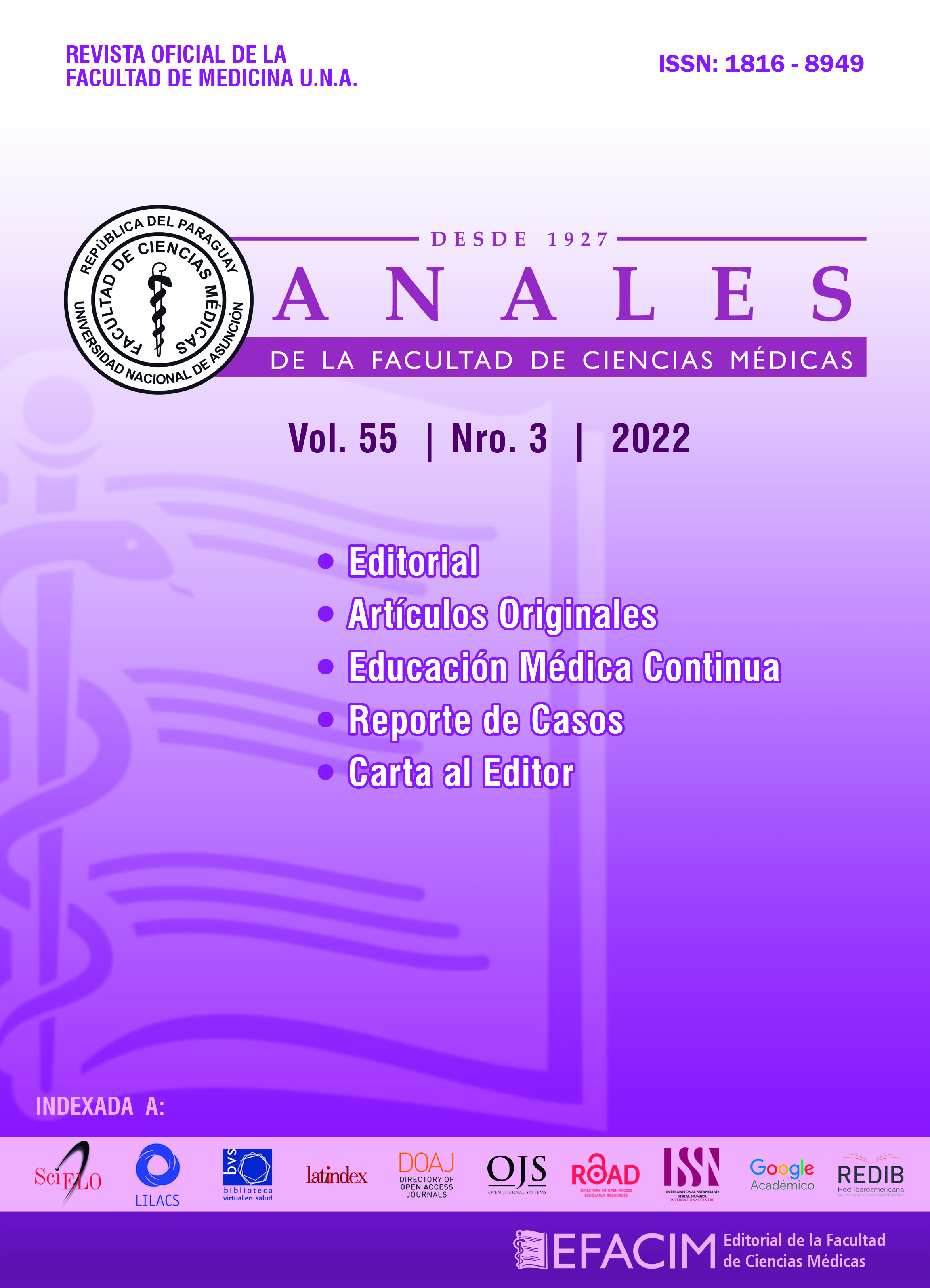Associated factors and psychometric properties of the Spanish version of the Brief Irritability Test (BITe) in Paraguayan population
Keywords:
irritability, validity, reliability, factor analysisAbstract
Background: Irritability, as a trans dimensional symptom, is present in several mental disorders. This study investigated the psychometric properties of the Spanish version of the Brief Irritability Test (BITe). Subjects and Methods: The recruitment has been performed through an online survey launched through common social media (Facebook, Twitter) and messaging apps (WhatsApp, Telegram) from 1st to 31st May 2022. Subjects included were individuals ≥18 years old of age of both sexes. 1920 individuals were rated for the validation analysis. The BITe has been translated into Spanish and validated through confirmatory factor analysis. Participants have been also scored with the Aggression Questionnaire (AQ). Results: Kaiser-Meyer-Olkin (KMO) test was adequate (KMO=0.880) and sphericity tested significantly (p<0.001). The confirmatory analysis confirmed that the scale is one-dimensional. The model adjustment was good, according to all fit indices. Cronbach’s alpha also confirmed an excellent internal consistency (α=0.91). Scores between the two scales (the BITe and the AQ) have shown a good convergence (r=0.512; p<0.001). Conclusions: The Spanish version of the BITe is a unidimensional scale of five Likert-type items that shows good internal validity and high reliability, which implies that this version has excellent psychometric properties for both male and female Spanish-speakers.
Downloads
Metrics
References
Vidal-Ribas P, Brotman MA, Valdivieso I, Leibenluft E, Stringaris A. The Status of Irritability in Psychiatry: A Conceptual and Quantitative Review. J Am Acad Child Adolesc Psychiatry. 2016;55(7):556–70.
Mikita N, Stringaris A. Mood dysregulation. Eur Child Adolesc Psychiatry. 2013;22(Suppl 1):11–6.
Salazar-Saavedra YM, Saavedra-Castillo JE. Factores asociados a irritabilidad en adultos con episodio depresivo en Lima Metropolitana. Rev Neuro-Psiquiatr. 2019 Jan;82(1):37–55.
Holtzman S, O’Connor BP, Barata PC, Stewart DE. The Brief Irritability Test (BITe): A Measure of Irritability for Use Among Men and Women. Assessment. 2015;22(1):101–15.
Bowling A. Just one question: If one question works, why ask several? J Epidemiol Community Health. 2005;59(5):342–5.
Muñoz Navarro SR. How many subjects do I need to power my study? Medwave. 2014;14(6):e5995.
Gosling SD, Vazire S, Srivastava S, John OP. Should We Trust Web-Based Studies? A Comparative Analysis of Six Preconceptions About Internet Questionnaires. Am Psychol. 2004;59(2):93–104.
Buss AH, Perry M. The Aggression Questionnaire. J Pers Soc Psychol. 1992;63(3):452–9.
Santisteban C, Alvarado JM, Recio P. Evaluation of a Spanish version of the Buss and Perry aggression questionnaire: Some personal and situational factors related to the aggression scores of young subjects. Personal Individ Differ. 2007;42(8):1453–65.
Rodríguez JMA, Fernández MEP, Gómez JLG. Adaptación psicométrica de la versión española del Cuestionario de Agresión. Psicothema. 2002;14(2):476–82.
Beaton DE, Bombardier C, Guillemin F, Ferraz MB. Guidelines for the process of cross-cultural adaptation of self-report measures. Spine. 2000;25(24):3186–91.
Love J, Selker R, Marsman M, Jamil T, Dropmann D, Verhagen J, et al. JASP: Graphical Statistical Software for Common Statistical Designs. J Stat Softw. 2019;88(2):1–17.
Schermelleh-Engel K, Moosbrugger H, Müller H. Evaluating the Fit of Structural Equation Models: Tests of Significance and Descriptive Goodness-of-Fit Measures. Methods Psychol Res. 2003;8(2):23–74.
Taber KS. The Use of Cronbach’s Alpha When Developing and Reporting Research Instruments in Science Education. Res Sci Educ. 2018;48(6):1273–96.
Cohen J. Statistical Power Analysis for the Behavioral Sciences. Burlington: Elsevier Science; 2013.
Nunnally JC, Bernstein IH. Psychometric theory. New York: McGraw-Hill; 1994.
Karadere ME, Çifteci K, Elbay RY, Yilmaz H, Karatepe HT. The Validity and Reliability of the Turkish Version of the Brief Irritability Test. AlphaPsychiatry Online. 2021;22(6):318–23.
Bellaert N, Blekic W, Kandana Arachchige KG, Lefebvre L, Rossignol M. French Adaptation of the Brief Irritability Test: Factor Structure, Psychometric Properties, and Relationship with Depressive Symptoms. Psychol Belg. 2022;62(1):47–61.
Ko CH, Long CY, Chen SY, Chen IJ, Huang TH, Yen JY. Depression, irritability, and anxiety in women with premenstrual dysphoric disorder. Int J Psychiatry Med. 2013;46(1):39–55.
Toohey MJ. Irritability characteristics and parameters in an international sample. J Affect Disord. 2020;263:558–67.
Uçar HN, Tekin U, Tekin E. Irritability and its relationships with psychological symptoms in adolescents with migraine: a case-control study. Neurol Sci Off J Ital Neurol Soc Ital Soc Clin Neurophysiol. 2020;41(9):2461–70.






